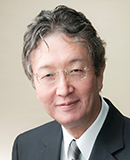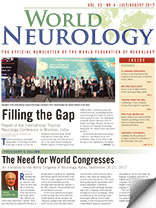
Ryuji Kaji MD, PhD, Professor of Neurology, Tokushima University, Japan
As a nominee by the Japanese Society of Neurology, I would like to stand for the office of the first vice president at the election.
Background
I graduated from Kyoto University in 1979 and pursued a specialty training in neurology. After completing a PhD course in Kyoto, I moved to Philadelphia in 1984 as a clinical fellow at the University of Pennsylvania, where I became interested in clinical neurophysiology. In the U.S., I met Dr. Jun Kimura, then professor of neurology in Iowa, and we returned to our alma mater together in 1989. Working in his department, I first reported the use of IVIg for multifocal motor neuropathy in 1992, and introduced the use of botulinum toxin for dystonia, which initiated my career in movement disorders.
In 2000, I left Kyoto to chair the newly established Department of Neurology in Tokushima. Thanks to my talented colleagues, I have stayed active in my academic career, publishing more than 500 papers in reputable journals such as Annals of Neurology, Brain, Nature, and New England Journal of Medicine. Our group has discovered two new genes, OPTN and TFG, causing ALS, and another, TAF1, responsible for dystonia.
International Activities
In 2000-2006, I served as an executive member of the International Federation of Clinical Neurophysiology (IFCN). I planned and led an expert meeting to establish a set of diagnostic features for ALS, now known as the IFCN Awaji criteria. I also served as a member of the international executive committee of the Movement Disorder Society (MDS).
WFN Activities
I served the WFN as an elected trustee from 2007 to 2013. Since 2010, I have chaired the newly formed Asia Initiative to promote proper neurological practice in this region, which covers more than 60 percent of the global population. Through the dedicated work by many colleagues involved in this project, the Asian Oceanian Congress of Neurology (AOCN) became one of
the most successful regional meetings under the auspices of the WFN. My current effort concerns the scientific programs of the WCN2017 Kyoto, as one of the co-chairs of the Teaching Course Committee.
Goals and Objectives: Synergy, Communication, and Autonomy
Working as chair of Asia Initiative, I have realized that, like Asia, many developing regions of the world are exploding in population, and the accelerated aging will bring neurological disorders such as stroke and Alzheimer’s disease to the forefront. We need to increase awareness of stroke prevention worldwide and to provide the survivors a means to regain their functional independence.
Through my activities in WFN, I have learned how to coordinate meetings and sessions with other international organizations—to achieve common goals of providing educational opportunities for young neurologists. Having served for IFCN and MDS, I feel myself capable of pursuing this interdisciplinary approach of synergy in promoting the cause of WFN.
A Filipino neurologist, who trained with us in Tokushima, drew our attention to Lubag disease, an endemic dystonia-parkinsonism, or XDP, in her hometown. We collaborated with local neurologists to describe specific pathological findings and to identify its causative gene, which should help find a cure for those patients.
Through this experience, I believe that the same approach of communication, collaboration, and compromise should work well in other parts of the world: All of the efforts must respect developing regions and their neurologists as equal partners.
Many young neurologists from developing countries still find it difficult to attend global meetings such as AAN or EAN. I would like to work to make all regional meetings equally as attractive for young neurologists, particularly as it relates to education. This principle of autonomy, in turn, should strengthen the value of the WFN, especially in the rapidly growing areas such as Arab-Africa and Latin America.
If I am elected first vice president, I will work with all my might to assist the new president to fulfill the mission of the WFN. I could also advise the president how to incorporate the successful Asian experience more globally to the other regions of the world.
I wish to take this opportunity to thank many national societies, which have already endorsed my nomination as first vice president, and hope that others will also be able to support my candidacy. Together, we can improve patient care through education of neurologists regardless of their place of practice.
